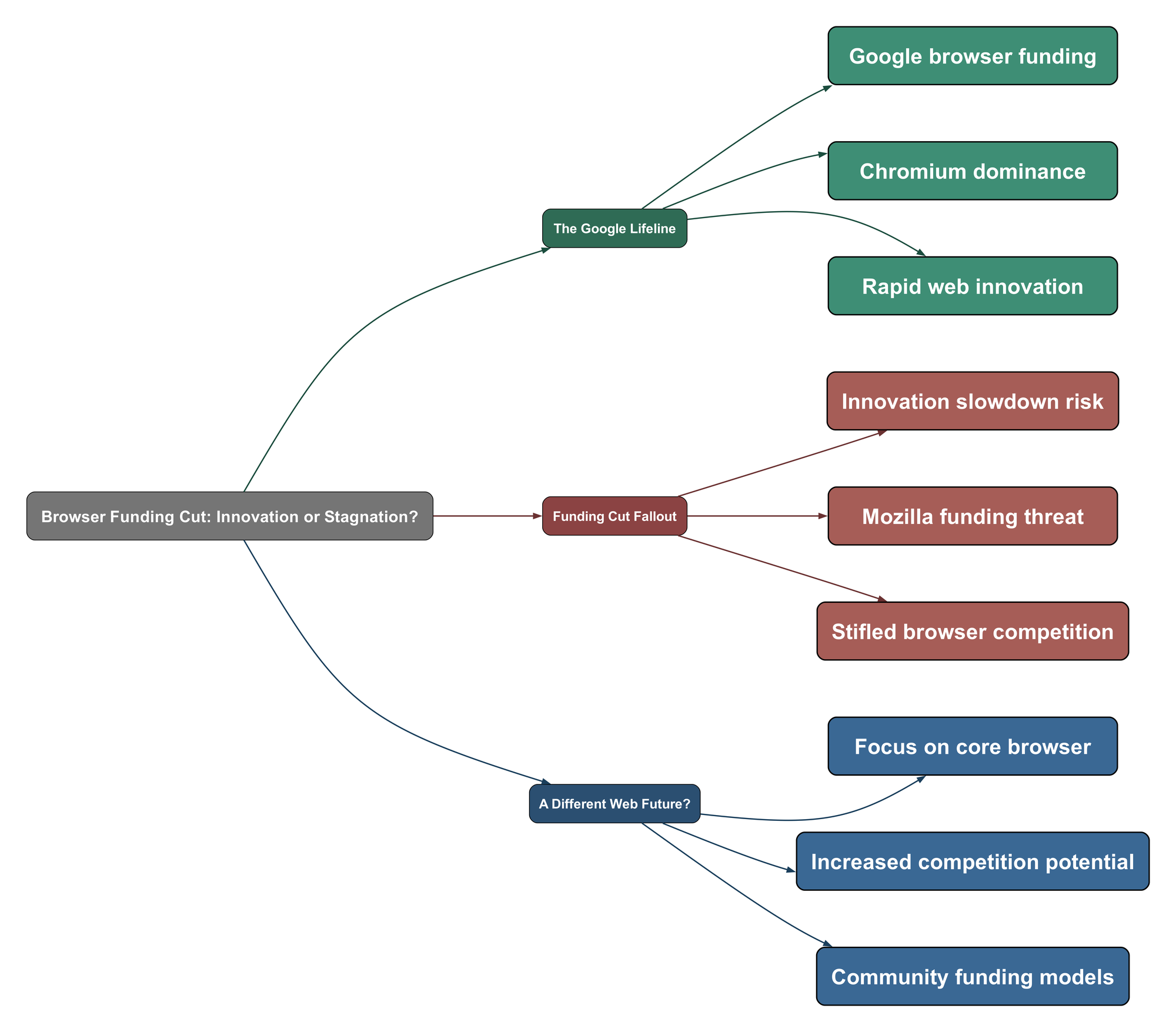Imagine the web browser, your gateway to the digital world, suddenly facing a massive financial shakeup. News suggesting major browsers could lose up to 80% of their funding, primarily from Google search deals, has sparked intense debate. What does this mean for the future of the web, innovation, and competition?
The Google Lifeline
For years, the browser landscape has been heavily influenced by funding from search giants, particularly Google. This financial backing has shaped the web as we know it.
- Google’s contributions, both direct funding via search deals (especially critical for Mozilla) and through its stewardship of the open-source Chromium project, have fueled much of modern browser development.
“All the major browser innovation that has happened during the last decade is because of the funding from Google towards Chromium.”
- This funding enabled significant advancements in security (sandboxing, isolation) and features (WebCodecs, WebGPU, WebRTC), benefiting the entire ecosystem.
“All the major security enhancement in terms of isolation, sandboxing, privilege separation happened IMHO due to a Google backed browser security research.”
- The Chromium engine, spearheaded by Google, now underpins most popular browsers, including Chrome, Edge, Brave, and Opera, creating a somewhat monoculture but also streamlining compatibility.
“Chromium: the base of Chrome, which is opensource – is developed in part by google and many other companies, including Microsoft, Apple, Brave, and dozens of others who depend on the chromium ecosystem.”
- Mozilla, in particular, relies heavily on Google’s payments (estimated around $450 million annually) for Firefox development, making its situation precarious.
“It’s way more critical for Mozilla—Google’s payment is what pays for Firefox.”
- While giants like Apple (receiving an estimated $18 billion) and Microsoft are less financially dependent, they still participate in and benefit from this ecosystem.
Funding Cut Fallout
The potential disruption of this funding model raises significant concerns and highlights existing tensions within the browser market.
- A major fear is that losing this revenue stream could drastically slow the pace of innovation, potentially leaving complex new features like WebGPU or WebCodecs to stagnate or become buggy.
“All of this required significant amount of resources to spec and implement. With 80% of funding cut, I struggle to see how it can be maintained. Would be sad to see this rot with bugs.”
- Beyond new features, the pace of essential security updates and bug fixes could decline, potentially exposing users to more risks.
“I wouldn’t personally mind if the pace of innovation changed to being far slower, but I would be concerned if the pace of CVE and bug fixing decayed badly.”
- Some view the current reliance on Google funding as effectively creating a barrier to entry, making it nearly impossible for new browser engines to compete.
“If you say browser developers need money from the search giant to compete in browser development, you are saying that – right now – you can’t compete in browser development without it. That is a cartel.”
- Conversely, others argue that the constant push for new features, fueled by ample funding, has led to unnecessary browser complexity, making the web harder to develop for and maintain.
“Good. Maybe we can fight back the browser complexity. When you have free browser money, it makes it much easier to partake in turning the web into morass of difficult to implement functionality…”
A Different Web Future?
While the challenges are real, some see this potential funding disruption not as an end, but as an opportunity for a positive reset in the browser ecosystem.
- Reduced funding might force organizations like Mozilla to refocus resources away from peripheral projects and concentrate purely on core browser development and stability.
“Perhaps with 80% of their funding gone, Firefox will be forced to stop wasting money on all those harebrained non browser initiatives and concentrate on … the Firefox browser.”
- A slowdown in the feature race could be beneficial, allowing the web platform to stabilize and potentially become simpler, reducing the burden on developers and users.
“In fact, if the primary function of code work for the next 5-10 years was to remove code, I’d be pretty much in favour.”
- Lowering the barrier created by rapid, heavily funded feature development could finally open the door for genuine competition from new browser engines, moving beyond Chromium reskins.
“We will almost certainly see a slowdown in improvements to the web and browsers if this goes through, but we’ll also see the door finally open to potential competitors that want to start a new browser engine…”
- The web might evolve towards a more sustainable, community-driven funding model, similar to successful open-source projects like Linux, where companies dependent on the technology invest collectively.
“Linux is a project spanning many decades… I do not see why something similar cannot be accomplished with the web… many companies pay developers to work on Linux because their business depends on it… The same applies for web browsers…”
The potential withdrawal of major funding presents both risks and opportunities. It challenges the status quo, forcing a reconsideration of how browsers are built, funded, and innovated upon. Whether this leads to stagnation or a healthier, more diverse ecosystem remains to be seen.





